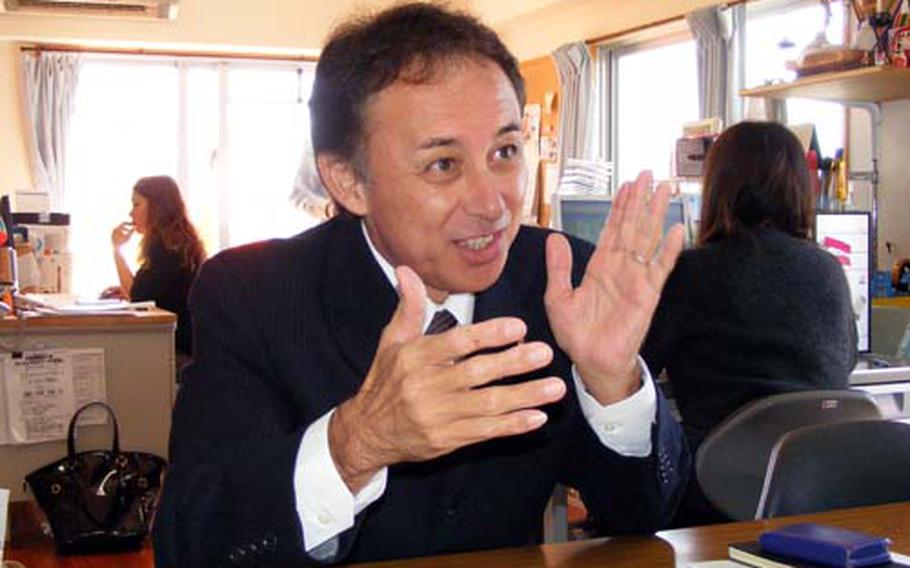
Japan Diet member Denny Tamaki says Marine Corps Air Station Futenma needs to be relocated outside Okinawa in order to show that Japan and the U.S. really care about reducing the U.S. military's footprint on the island. (David Allen / S&S)
OKINAWA CITY, Okinawa — The Diet member who represents the area where a new Marine Corps air station is planned says he’s against the project and that any new facility must be built outside Okinawa.
“It’s the only way to prove to the Okinawa people that both countries are serious about reducing the U.S. military presence here,” Denny Tamaki, the only Amerasian in the Diet, said through an translator during a recent interview at his office in Okinawa City.
Tamaki sees himself as representing the best of both worlds. He loves his American heritage — especially rock ’n’ roll — but as an Okinawan he resents the U.S. military’s large footprint on his island home.
And as the first Amerasian representative in Japan’s House of Representatives — he’s the equivalent of a U.S. congressman — Tamaki hopes he can help the two nations find a middle road on the thorny issue of closing Marine Corps Air Station Futenma.
Tamaki, 50, who speaks little English, is the son of an Okinawan waitress and a U.S. Marine who left the island shortly before he was born. He never met his father, but he inherited many of his features — enough so that he had to deal with racial prejudice as a child.
A popular radio personality and disc jockey for 13 years, Tamaki was also a city councilman before he was swept into office when the Democratic Party of Japan trounced the Liberal Democratic Party in lower house elections in August.
Part of the party’s platform was to build a more equal defense partnership with the United States. Since taking power, the party has called for a review of the bilateral 2006 “Roadmap to Realignment” that called for closing MCAS Futenma — in the middle of urban southern Okinawa — and building a new air facility on Camp Schwab and reclaimed land in Oura Bay on Okinawa’s rural northeast coast.
Tamaki, a member of the Lower House Standing Committee on National Security and director of the Special Committee on Okinawa and Northern Territories Affairs, said area residents don’t want a new base in their back yard.
Last weekend, he hosted a town meeting in Nago, the city that hosts Camp Schwab, and residents expressed their disillusionment with Foreign Minister Katsuya Okada.
Okada tried to talk about the government’s efforts to review the relocation plan, but residents — some yelling at Okada — wanted to tell him the project was unacceptable.
Tamaki smiled. “I believe that their voices were certainly heard.”
Tamaki said he’s not anti-American or against all the U.S. bases.
“The people of Okinawa know very well that the military presence contributes greatly to the local economy,” he said, noting it makes up about 10 percent of the economy.
“Very few people want to remove all of the military bases on Okinawa,” Tamaki said. “What they want to remove is the pollution, accidents and incidents stemming from the military activities. We are not asking to close Kadena Air Base, Torii Station or White Beach.”
Tamaki said his background makes him unique in Japanese politics. He was raised poor by a single mom who destroyed all traces — pictures, letters and other documents — of his father.
He was bullied in school because of his mixed heritage and attended a trade school in Tokyo.
“My dream is to invite President Barack Obama to Okinawa,” he said. “I believe we have a lot in common.”
After graduation, Tamaki worked in a nursing home and an interior design shop while singing in rock bands at night. Ultimately he found his voice as a radio personality on an Okinawa station.
“I have a passion for rock ’n’ roll, especially hard rock,” he said. His favorite American artists are Nickelback, Led Zeppelin, Aerosmith, Deep Purple and John Mellencamp.
Although his mother changed his first name, Dennis, when she gave up ever moving to the U.S., Tamaki changed it back to Denny for his public persona.
“I love this name, Denny Tamaki — American first name and Japanese last name; it really represents who and what I am,” he said. “Because of my background, I am confident that my voice can reach far.”